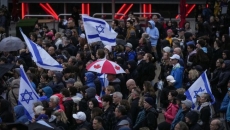After four years that included mask mandates, vaccination requirements, gathering restrictions, surging hospitalizations and thousands of deaths, British Columbia’s top doctor has ended the province's public-health emergency for COVID-19.
Provincial health officer Dr. Bonnie Henry said Friday that all remaining restrictions, including the vaccination requirement for health-care workers, will be rescinded.
"While COVID-19 is not gone, we now have high levels of protection in the health-care system and in communities throughout B.C.," she told a news conference.
After reviewing all the data, Henry said she was confident the province had reached the point where there was no longer a need for the public health emergency.
Henry said she looked at data including infection rates, immunization rates, deaths and hospitalization numbers, as well as the "evolution" of the COVID-19 virus over time.
There had been a resurgence of COVID-19, she said, referencing the positive test result for U.S. President Joe Biden last week.
But infection rates have been coming down, she said, adding Omicron is still the predominant strain and the virus hasn't changed as quickly as it did during the early days of the pandemic.
"Wastewater indicators and testing data show COVID-19 has levelled off and the number of people in intensive care and in hospitals is lower and stable," Henry said.
"The level of protection provided by vaccines and hybrid immunity is also helping."
Over the last week, fewer than 200 people have been in hospital with COVID-19 in B.C., she said, including 11 who were in intensive care.
Henry said the virus would likely surge again in the fall, which could prompt restrictions over time.
"We know (the virus) is inevitably going to mutate," she said. "It may be that we'll need to have different varieties of the vaccine over time."
The public health emergency was declared on March 17, 2020, and B.C. was the first province to record a COVID-19 death in the country. Mask mandates followed the emergency declaration, gatherings and public events were cancelled, businesses shut down and those who could began working from home.
The World Health Organization declared in May 2023 that COVID-19 was no longer classified as a global health emergency.
The restrictions associated with the pandemic, including vaccine mandates, had become political flashpoints in B.C., across Canada and beyond.
Joining Henry on Friday, Health Minister Adrian Dix said health workers fired due to previous orders can apply to fill available positions, although they must provide their "immune status" for certain pathogens, including COVID-19.
Dix said "99 per cent" of health-care workers had been vaccinated against COVID-19 and the number of workers fired was relatively small. He used figures from the Northern Health Authority as an example, saying two full-time nurses and one part-time nurse lost their jobs as a result of the mandate.
A B.C. Supreme Court decision upholding the province's vaccine rules earlier this year said approximately 1,800 health-care workers lost their jobs over the vaccine mandate.
Dix defended the measure Friday, saying the vaccination requirement was "instrumental in protecting health-care workers against severe COVID-19 illness and complications, reducing the transmission to vulnerable patients and care-home residents, and supporting the resiliency of our health-care system."
In response to a question about the timing of the announcement a few months before the provincial election in October, Henry said her determination had "nothing to do with any of the decisions of government or other factors in that sense."
"There is an obligation under the Public Health Act for me to lift orders as soon as reasonably possible when the conditions are no longer met," she added.
Henry said the change could potentially have been made "a few months ago," but there was still uncertainty around the impacts of a spring wave of COVID-19.
With the vaccine requirement lifted, Dix said the B.C. government was requiring health workers to register their vaccination status for illnesses including COVID-19, influenza, measles, mumps, German measles, hepatitis B, whooping cough and chickenpox.
"The intention of this registry is to protect people, to ensure that the health-care system can best respond to challenges in the future, and to increase rates of vaccinations across categories quickly and efficiently," the minister said.
Henry said she believed the changes struck "the right balance of protection" for health-care workers, patients, the health-care system and the broader community.





